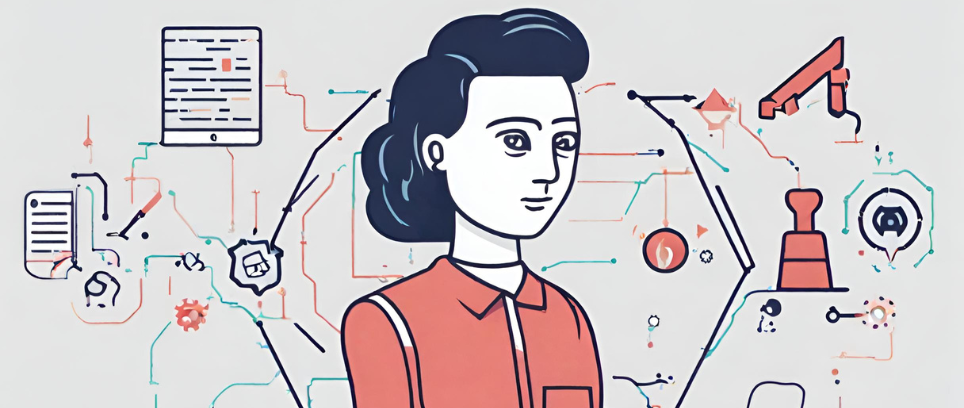The field of artificial intelligence is expanding rapidly, creating significant impacts across various industries. One pivotal role within this domain is that of an AI developer.
Over recent years, innovations like voice assistants such as Siri and Alexa, alongside the proliferation of chatbots like ChatGPT, have showcased the prowess of AI.
Projections suggest that by 2025, the Global AI market could soar to over $190 billion, underscoring the growing demand for skilled AI developers.
This article delves into the realm of AI development, offering insights into the role and outlining the pathways to becoming an AI developer.
What does an AI developer do?
An AI developer is a specialized software engineer immersed in crafting AI systems, harnesses their expertise in programming, machine learning, and data science to fashion intelligent solutions capable of executing tasks autonomously, circumventing the necessity for human intervention.
When delving into the freelance or project-based realm, an AI developer can expect to command a median pay rate ranging from $25 to $50 per hour.
The Bureau of Labor Statistics (BLS) foresees a substantial surge in demand for professionals in software development and quality assurance (QA) analysis, estimated to spike by 25% through 2031. As of 2021, the median salary for individuals in this field stood at $109,020, indicative of the lucrative prospects awaiting skilled AI developers in the current landscape.
Main responsibilities of an AI developer
An AI developer undertakes various pivotal tasks as part of their role. Let’s delve into the core responsibilities that AI developers regularly handle:
1. Addressing business challenges:
AI developers are adept at devising innovative solutions to tackle everyday issues by integrating and implementing AI technologies effectively.

2. Developing AI systems:
These professionals craft AI-driven systems leveraging diverse tools such as machine learning algorithms, natural language processing (NLP) systems, computer vision systems, deep learning techniques, and other AI methodologies.
3. Programming and Software development:
AI developers excel in coding and software development using languages like Python, Java, and C++, while also harnessing frameworks and libraries such as TensorFlow, PyTorch, and Scikit-learn.
4. Data analysis and Model training:
Working with extensive datasets, developers refine their skills in data analysis and model training, employing algorithms and statistical techniques to optimize machine learning models.
5. Staying abreast of Emerging Technologies:
Given the continuous evolution of AI products and methodologies, AI engineers prioritize staying updated on new tools and emerging technologies to remain at the forefront of the field.
Skills needed to become an AI developer

Step 2: Learn computer science and programming languages
As you step into the world of AI development, having a strong grasp of computer science and proficiency in programming languages is crucial.
Make sure to spend time studying the basics of computer science, understanding algorithms, and getting familiar with data structures.
It’s also important to become skilled in programming languages like Python, Java, and C++. These skills will be vital for your success in AI development.
Step 3: Master machine learning and deep learning concepts
To prepare for a thriving career as an AI engineer, it’s essential to grasp machine learning algorithms, regression, and classification.
Delving into deep learning techniques, neural networks, and convolutional neural networks (CNNs) is also crucial groundwork for the tasks ahead. Allocate time to familiarize yourself with these concepts, as they will be invaluable assets in your future endeavors in the field of AI engineering.
Step 4: Develop skills in data science and analytics
AI developers regularly engage with data science and analytics tasks, making it imperative to acquire proficiency in data preprocessing, feature engineering, and data visualization. As you hone your skills, delve into these areas to enhance your expertise.
Working hands-on with datasets and conducting statistical analyses will further solidify your understanding and aptitude in this domain.
Step 5: Gain hands-on experience with AI projects
Step 6: Enhance technical skills with frameworks and tools
As you step into the field of AI, you’ll likely encounter opportunities to work with popular AI frameworks like TensorFlow, PyTorch, and Scikit-learn.
Before diving deeper into your training or career, it’s crucial to understand how these tools operate and the range of tasks they can accomplish. Additionally, exploring application programming interfaces (APIs) and libraries that facilitate AI development and deployment will be beneficial.
By familiarizing yourself with these resources, you’ll be better equipped to leverage advanced technologies and enhance your skills in AI development.
Step 7: Develop soft skills for effective collaboration
As an AI developer, collaboration is key.
You’ll collaborate with various stakeholders and team members on group projects and joint initiatives. To ensure the success of these endeavors, focus on refining your communication and teamwork skills.
Additionally, seek opportunities to enhance your problem-solving and critical-thinking abilities, enabling you to effectively address complex AI challenges and contribute to the smooth operation of projects.
Step 8: Stay updated and continuously learn
In the dynamic field of AI, staying abreast of advancements and trends is crucial, given its continuous evolution and growth. Keep yourself updated by delving into research papers and actively participating in discussions with fellow AI developers.
Consider investing your time in online workshops and tutorials led by seasoned AI engineers. These resources, facilitated by experts, can provide invaluable insights and hands-on learning experiences to further your education and development in the field. Exploit the plethora of online resources available to enrich your knowledge and stay at the forefront of AI innovation.
Step 9: Build a professional network and showcase your work
Searching for job opportunities can indeed pose challenges, but networking with industry professionals can greatly aid your quest. Cultivate your LinkedIn profile and forge connections with peers in your field, as they may be aware of available positions or can offer valuable insights.
Moreover, consider crafting a portfolio or GitHub repository showcasing projects you’ve undertaken previously. This tangible display of your work can serve as a powerful supplement to your resume, accentuating your skills and past accomplishments. Sharing your portfolio alongside your resume can leave a lasting impression on potential employers, enhancing your chances of securing a rewarding position.
 Pin
PinStep 10: Explore career opportunities and apply for AI developer roles
Before diving into your job search, take the time to explore career opportunities in AI development, data science, or machine learning engineering. This research will provide insights into available positions and help you identify relevant keywords to use during your search.
As you begin applying for roles, be sure to adequately prepare for interviews by practicing technical questions and highlighting your hands-on experience. Hiring managers will likely inquire about your past projects and areas of expertise, so be ready to discuss them in detail.
Join Accredian and start your journey from insights to algorithms today! With our extensive collection of Data Science resources, pursue a fulfilling career in data science.
Let’s make your data-driven dreams a reality!
Contact us for any questions or comments.







